#Homosexuality in the Biblical World
Text



Monday
Today is the last day of my BA Thesis.
My last paper is due tonight at midnight.
I am proud for myself for getting this far, and reasonably confident that my mark for this paper will be at least as good as the two before it. It’s been a crazy summer and one full of hard work, but I stuck with it and am on track to finish by this evening.
To anyone contemplating a BA Thesis; you can definitely do it! It’s a bit of work, but it’s also incredibly rewarding to get to work on you own area of interest. Going into this I wasn’t sure how hard it would be. I tried my best, asked questions when I needed to, and sought out support and accommodations where necessary. It’s definitely a challenge, but for me it’s been a fun and rewarding one.
#ba thesis#homosexuality in the biblical world#university life#university studyblr#university student#university studyspo#university#dark academia aesthetic#dark academia#study inspo#study inspiration#study motivation#studyblr#studyspo#aelstudies
48 notes
·
View notes
Note
The relevant passage from the book re. Sodom and Gomorrah:
“Come off it. Your lot get ineffable mercy,” said Crowley sourly.
“Yes? Did you ever visit Gomorrah?”
“Sure,” said the demon. “There was this great little tavern where you could get these terrific fermented date-palm cocktails with nutmeg and crushed lemon-grass–”
“I meant afterwards.”
“Oh.”
-
And then they are silent for some time.
(It was the book passage that made me think of them as two gay men in 1990 and not some great ethereal/occult humanist Cold War metaphor. Having that conversation at the end of the AIDS crisis you know. Pretty gay human man of them.)
.
#contextually this makes all the replies saying ‘it’s not about homosexuality’ so so much more insufferable#they argue ‘biblically it’s not about gayness’ as if the book wasn’t written WITH the connotations already set#like good omens inherently isn’t about the bible. it’s not! it’s about the public’s relationship to the bible#that’s how you get minisodes to book of job and the four horsemen and blah blah blah#like the book wasn’t written in some sort of bunker with 0 access to the outside world#interpretations and the way they solidify themselves into societal understanding IS the point#not ‘actually in the original text if u squint it says this’ like that’s not what this is abouttttt#thank u anon#ask box
35 notes
·
View notes
Text
Alright GO fans, let's talk Sodom and Gomorrah. This biblical story comes up a few times in Good Omens canon, a kind of offhand mention each time, and the most interesting part to me is the implication that Aziraphale was there.
If you only know the cliff-notes version, you've probably heard it as the story of God condemning homosexuality to the point of wiping out several cities over it. Maybe you've heard this too, but - that's not exactly what happened. Look, I'm an atheist, I have no dog in this race. If I thought it was about smiting people for homosexuality, I'd be happy to call God a wanker and move on. But I've read the story of Sodom and Gomorrah (You can too! It's very short!) and I've read other parts of the Bible that reference it, and I think a much more straightforward interpretation is that it's about offering hospitality and protection to strangers. It's also about the consequences of wanton cruelty, and God laying waste to those deemed beyond salvation.
In Good Omens, the book, Aziraphale and Crowley discuss Sodom and Gomorrah this way:
"Come off it. Your lot get ineffable mercy," said Crowley sourly.
"Yes? Did you ever visit Gomorrah?"
"Sure," said the demon. "There was this great little tavern where you could get these terrific fermented date-palm cocktails with nutmeg and crushed lemongrass-"
"I meant afterwards."
"Oh."
According to the book, then, Aziraphale at least saw the city after it was destroyed. Maybe Crowley saw the aftermath too or maybe he just heard about it. They both understand it as horrific.
The show is more direct, and suggests that Aziraphale was there during the actual destruction. Gabriel asks if Aziraphale remembers Sandalphon. Aziraphale does.
"Sodom and Gomorrah. You were doing a lot of smiting and turning people into salt. Hard to forget."
Aziraphale regards Sandalphon warily during the conversation. I believe we're supposed to interpret this scene based on the popular understanding of Sodom and Gomorrah as cities that God wiped out because of the inhabitants' sins. The obvious implication, then, is that Sandalphon is the heavy, the one called in to deal with disobedience. He's trigger-happy, relishes violence, and Aziraphale has seen what he's capable of. From the careful way Aziraphale discusses their prior acquaintance, I think he feels the destruction of Sodom and Gomorrah was a tragedy and believes Heaven's actions were disproportionate and unjust.
I'm confident this is how we're supposed to read the scene. In the context of the story, we're supposed to understand that Aziraphale doesn't approve of the smiting, and that he feels threatened by Gabriel and Sandalphon coming into his bookshop and pressing him about Armageddon. But I'm fascinated by what it would mean if Aziraphale and Sandalphon's history really tracks onto the story of Sodom and Gomorrah. Because if Good Omens' version of Sodom and Gomorrah is at all biblically accurate, and if Aziraphale was there... it's kind of mind-blowing, actually, that he still feels so much compassion for the people who died and still thinks Sandalphon was wrong.
I'm going to explain why, but fair warning, it gets ugly. I promise nobody is actually raped, and I think that promise in itself says plenty.
According to the Bible, Sodom and its surrounding cities are accused of being overrun with sin. God sends two angels to Sodom to verify this, intending to destroy everything if they find it to be true. In the world of Good Omens, I think one of these angels must be Aziraphale. The other one is likely Sandalphon, but in the Bible it's God rather than either of the angels who rains down burning sulfur on the cities so it's possible it's someone else, and Sandalphon is only on smiting duty. Without anything else to go on, though, let's assume it's Sandalphon.
So our two angels arrive at Sodom in the evening, and at the gate to the city, they meet Lot. Lot is an immigrant who has made his home in Sodom, and I think the implication is that this is why he's not completely steeped in sin like everyone else. In any case, he immediately offers to put the angels up for the night, and although they'd planned to stay in the square, Lot is really insistent. He is a good host! Also, he knows the city is dangerous. So the angels go to his house and he makes dinner for them, and then before they can go to bed, a mob shows up at the door.
See, the men of Sodom have heard about the strangers staying with Lot. They surround his house and demand he hand them over. The New King James Version puts it this way: And they called to Lot and said to him, "Where are the men who came to you tonight? Bring them out to us that we may know them carnally." Several other translations say that the men wanted to "have sex with them". But I mean. It's a fucking mob. They've surrounded the house. We all get what this is, right?
So Lot goes out to meet the men, and he says "Don't do this terrible thing." Off to a good start! Then he says, "Tell you what, I have two virgin daughters. Do what you like to them and we'll say no more about it." Oh boy. Dad of the year award, right there. But still, he insists, "The angels are under my roof and my protection."
The men outside Lot's house are pissed. They say, "You're an outsider, who are you to judge us?" They threaten to do worse to him than to the angels. They swarm him and almost break the door down, but the angels pull him back inside.
The angels then strike the mob with blindness to stop them getting into the house. They say to Lot, "Look, you gotta take your family and get out of here. God sent us to see how bad things were and, uh, long story short, we're burning it all to the ground. You get it, right?"
Maybe you know the rest. Lot's son-in-laws don't believe him and won't leave the city. Lot's wife looks back and turns into a pillar of salt. Lot and his daughters take shelter in a small town called Zoar, and from there flee to the mountains. Everything else is destroyed.
It is a tragedy. The plains are leveled down to ash, until there's nothing left that can even grow. Was there really no one innocent in those cities? No children or animals? (You can't kill kids). Still, I think about that awful night under Lot's roof and I don't think I could blame anyone for giving up on all of it.
So what if that's the story? There were two angels in Sodom before it fell. What if it really was Aziraphale and Sandalphon, trapped through the night in a stranger's house, surrounded by men who want to rape them. Whatever their power as angels, that has to be terrifying.
If it was Sandalphon there with Aziraphale that night in Sodom, I have to wonder what he was like. There isn't any kinship or understanding from Aziraphale. Despite knowing the circumstances better than anyone, he still sees Sandalphon as a threat. Given that, I think Sandalphon must have taken a truly disturbing kind of joy in raining down vengeful fire and brimstone, beyond what you might expect from someone who was afraid or angry. Maybe he was never afraid; maybe instead he revelled in the violence building through the night as the reason he needed to tear everything down. Maybe he was afraid in the terrible way that exposes the depths someone will sink to to protect themselves (maybe offering his daughters was never Lot's idea). Or maybe Aziraphale just tried to reach out to him afterwards, to offer understanding and ask for some in return, and Sandalphon shot him down so coldly and viciously that Aziraphale knew immediately this wasn't something he was allowed to have feelings about. Whatever happened that night, it left Aziraphale feeling more of an outsider from Heaven than ever.
But if it happened that way, it happened this way too: Aziraphale survives a night like that, and when he looks out into the breaking dawn, he thinks, these cities don't deserve to burn. He sees the good in a place that's just shown him its absolute worst. I think that says everything about him as a character, actually. Of course he won't give up on Heaven. Of course he'll fight tooth and nail for his home on Earth. Whatever the worst is, there are still things worth saving. There are still, always, people worth protecting.
On that note, before I wrap this up, I want to go back to Lot's words to the men of Sodom, and draw a parallel that makes me feel some kind of way. Because when Lot declares the angels under his protection, what he says is essentially, "Do not do anything to these men, for they have come under the shadow of my roof for protection." And all I can think about, reading these lines, is Aziraphale standing in his bookshop as it's surrounded by hostile demons, and telling the angel under the shadow of his roof, "You came to me. I said I would protect you. And I will."
717 notes
·
View notes
Text
The LDS Church & homosexuality
Some church goers are uncomfortable that I identify as gay. They think how my Creator made me is somehow against God, but I’m allowed to stay in my church because I’m single and celibate which means I am following my church’s teachings on sexuality, which also matches historical Christian teachings on sexuality.
You know who isn’t following those historical teachings? Straight couples who use birth control. Also breaking the historical rules are straight couples where one or both of them divorced a former spouse.
By historical, I mean the majority Christian understanding of the past 2000+ years. But we don’t even have to go back that far. I’m a member of The Church of Jesus Christ of Latter-day Saints (which I’ll refer to as “the church” or “LDS Church”), let’s look at some of it’s more recent teachings & practices:
In the 1960′s, at General Conference it was taught that using contraception was a gross wickedness.
In the 1980′s, the LDS Church told bishops not to issue temple recommends to married couples who engage in oral sex.
Even up to 2020, the Handbook said church members had to consult with their bishop before getting a vasectomy or tubal ligation because this was seen as a moral issue since it would prevent them from having more children.
This is not ancient history!
Over the past 50 years, the church has liberalized sex for straight married couples. Current LDS policies are that birth control is considered a private matter for the married couple to decide and bishops are instructed not to ask married couples about their sexual behaviors. Oral and anal sex, or any other sexual act that may not result in pregnancy, are no longer considered moral dangers which the church needs to stop straight married couples from exploring. As one friend of mine described it, once you’re married, anything goes as long as there’s consent from both partners.
————————————————————
For gay couples, there’s been a little bit of movement by my church, but nothing like what has happened for straight couples.
Gay individuals are now allowed to call themselves “gay” without getting in trouble, they’re allowed to date and hold hands and kiss without having to confess or have their church membership put in jeopardy (unless you attend the church’s schools where you may get punished for those behaviors). However, for gay couples, marriage or sex will both bring discipline and possible expulsion from the church.
————————————————————
The Biblical viewpoints on sexuality come from a time and culture that valued women for their ability to produce children. Infant mortality rates were high and overall population growth was slow. Any kind of sex that couldn’t result in a pregnancy was forbidden (even if not the intent of the original text, that’s the interpretation made by Christians and taught for centuries)
Today, infant mortality rates are low, life expectancy is high, and the world’s population is at a whopping 8 billion (it first reached 1 billion in 1804, 2 billion in 1927, and has continued to expand at a quickening pace). The reality of our lives has changed.
Biblical understandings of orientations were very different from today’s. Even modern understanding has evolved as prior to the 19th century, the concept of a sexual orientation was absent from Western culture.
————————————————————
Let’s take a look at the evolution of the LDS Church’s positions on homosexuality.
Labels
In the 1960′s church leaders took a hard stance against even identifying as gay. Calling yourself gay or a homosexual could result in excommunication.
In the 1980′s, the church separated having gay feelings from behaviors. Feelings and attractions were no longer a sin, just the behaviors. However, what labels queer members should use was still a hot topic. Same-sex attraction was the preferred label.
I remember being told in the 1990′s that the terms gay, lesbian, or bi should only be used as adjectives to describe behaviors or feelings, not people. People were encouraged to say they experience same-sex attraction (SSA) and not call themselves gay.
While calling yourself lesbian, bi or gay is still not encouraged, in 2016 the church finally said it’s okay to do so.
—————————
What causes someone to be gay
The church taught people developed homosexual feelings due to a variety of reasons. These reasons changed over the decades, but here are some of the things the church taught as causing homosexuality: masturbation, sexual abuse, wearing gender non-conforming clothing, or even just talking about homosexuality. In other words, having gay attractions was a mental disorder for which someone needed help.
Gay people have been disagreeing for decades, explaining we didn’t choose to be gay and it isn’t the result of abuse or other such causes, it’s just how we are.
Since 1990, there’s been a steady accumulation of research to show that a person’s sexuality is determined before birth. Yet the church resisted change. Recognizing that it’s previous statements on the causes of homosexuality conflict with the research, in 2006 the church stated that it has no opinion on what causes someone to have homosexual attractions.
In 2010, Boyd K. Packer taught in General Conference that since God’s Plan is for men & women to have sex with each other in a marriage, God wouldn’t give people same-sex attractions without a way to change them while also prohibiting them from being able to act on these attractions. "Why would our Heavenly Father do that to anyone?" That is a damn fine question to which the church has yet come up with a good answer. It leaves the church in a quandary that it acknowledges people are gay, they don’t choose to be gay, and they can’t choose to not be gay, and yet they're still prohibited from having sex or getting married
—————————
Reparative/Conversion Therapy
Given the way the church thought about what causes someone to be gay, it’s little wonder it also taught someone could be ‘cured.’ The 1960′s saw a big increase of statements from top leadership in the church teaching this.
In Sept 1969, the BYU Psychology Department begins electroshock aversion therapy research against ‘sexual deviancy.’
In 1978, gay students who attend BYU are still required to do conversion therapy, but no longer will aversion therapy be used.
In 1992, the church discouraged leaders of local congregations from encouraging members to change their sexual orientation from homosexual to heterosexual as that generally leads to frustration and discouragement.
In 2016, the church created the Mormon and Gay website which declared conversion therapy or sexual orientation change efforts are unethical. It seems that it’s around this time that BYU ceased conversion therapy
It took until 2019 for LDS Family Services (the church’s therapy arm) to say it no longer tries to change a person’s sexual orientation, in other words, no more reparative therapy.
—————————
Mixed-orientation marriages
In the 1970′s and 1980′s, gay men were actively encouraged to marry a woman with the promise this would "cure" their homosexuality (the church is focused on gay men while barely showing any concern for lesbians). I suppose this could be seen as another attempt at reparative therapy.
In the April 1987 General Conference, Gordon B. Hinckley said marriage shouldn’t be used as a way to cure homosexuality. But for men who were able to have some attraction to a woman, or who had a great desire to be married with a family in spite of who they are attracted to, mixed-orientation marriages were still encouraged.
In 2006, it was stated mixed-orientation marriages are no longer encouraged as therapy or a solution to deal with homosexual feelings. It’s a little more expansive from the 1987 statement which was only about using marriage to cure homosexual feelings. While this is the official policy, many leaders still encourage gay people to enter mixed-orientation marriages, and not just at the local level. David Archuleta shared in 2022 that an apostle had encouraged him to marry “a good girl.”
Mixed-orientation marriages don’t have a good track record, even for LDS couples, about 70% of them end in divorce. This is why I think the church stopped encouraging them.
—————————
The fight against gay marriage
In the 1990′s and 2000′s, the LDS Church’s fight against gay marriage invoked the fear that if gay marriage was legalized, within one generation the world’s population of humans would be wiped out.
Somehow they thought homosexuality was so alluring that everyone would choose it and no more children would be born. Makes me wonder how many repressed gay men were in the ranks of the church leaders.
Once gay marriage was legalized, the church moved to explain why it still wouldn’t allow gay marriages among its members. Here’s some of the attempts:
The church has continued to teach that God only approves of a man & a woman who are married and sealed together. They will sometimes refer to scriptures as if that settles the matter, but even a casual reading of those verses will leave a person wondering what they have to do with a gay couple, or why a verse about polygamy is used to support 1 man + 1 woman.
With the growing acceptance of gay people and calls for change, in 2019 Elder Oaks introduced the idea that the 2 great commandments are in conflict and we need to not accept our gay neighbor too much because it would conflict with obeying the 1st command to love God. Later in a 2023 YSA fireside, Elder Oaks backed off of the idea that there's tension between the 2 great commandments.
In 2021, Elder Oaks introduces the idea that the church is only about helping people aim for the highest degree of the Celestial Kingdom, and that requires a straight couple being sealed. Queer people can’t fit that, so they will go to a lower kingdom, and those are really good, so they’ll be fine. (it feels like an attempt to placate those who want more, like how the idea of civil unions was meant to satisfy gay couples and keep them from wanting to get married)
In 2023, Elder Oaks added the idea that everyone who “keeps their covenants” are assured of having a sealed relationship. I think this is his way of saying gay marriage isn’t needed because that won’t last and eventually after you’re dead you will get to be in a straight marriage so just be patient.
In 2023, a survey by PRRI shows that as of 2022 50% of active LDS members of the church in the United States approve of gay marriage. So I would say these attempts against accepting gay marriage are not yielding the hoped-for results
—————————
Status of children of gay couples
In 2015, in response to the legalization of gay marriage across the United States, the LDS church implemented a new policy which forbids children from joining the church, or advancing in church, if one of their parents is in a gay relationship. Sadly, this mostly affected children who grew up in church as they were born to a couple in a mixed-orientation marriage which had broken up and the gay spouse found a same-sex partner.
In 2019, as part of undoing the 2015 policy, it was shared that many exemptions to the policy had been granted since 2015, and that the policy against the children is no longer in effect.
—————————
Law of Chastity
For many decades, “acting” on same-sex attractions was considered against the law of chastity. Many took this to include not just sexual acts but also dating or even hugs and holding hands.
In 2019, as part of undoing the 2015 policy which banned the children of gay couples from joining the LDS church, the statement was made that "immoral conduct in heterosexual or homosexual relationships will be treated in the same way." Many interpret this to mean dating, hand holding, and other activities that single heterosexual adults are allowed to engage in before marriage, these are now allowable for gay people. Not all local leaders agree with this interpretation, and in 2023 the BYU Honor Code was updated to forbid “same-sex romantic behavior.”
————————————————————
Within my lifetime, the law of chastity restrictions on straight couples have gone away as long as they’re married.
For gay people, the church now acknowledges they exist and it isn’t a choice to have these feelings. You may be allowed to date and hold hands and kiss but it is not encouraged because it can lead to a gay marriage.
Church leaders and members from a few decades ago would be shocked at the current teachings and practices of the LDS church in regards to sexuality, both for straight and gay people.
It is odd to hear church leaders claim the law of chastity isn’t subject to change, that doctrines never change, our teachings about homosexuality will never change, and yet we have a history of change. What's the point of being a church of continuing revelation if we say there will be no further revelation?
I hope for our leaders to receive "further light and knowledge.” We claim to be a church of revelation, so let’s get inspiration on how God’s queer children fit into God’s plan, on the blessings available to them, on how they bless the rest of the church, and their purposes in life. Let queer people have joy and hope in this life.
83 notes
·
View notes
Text
If you are a WoD fan and you aren’t aware of how fucking wild White Wolf’s strategy for marketing Demon: the Fallen was, that changes right fucking now, get ready.
So, the year is 2002, American Culture is still moving past the Satanic Panic, and your job is to market a Table Top Role Playing Game where you play as literal demons who were aligned with the Biblical figure of Lucifer. The book has a big ass pentagram on its cover, and is filled with information on fictional demons and their demonic powers.
How do you market this?
Well, isn’t it obvious?
You satirise Chick Tracks by making a fake one about how the game you’re supposed to be promoting is satanic. I’ve linked it below, it’s only 23 pages long;
But you may be thinking: “Ok, that’s a funny concept, but why is this such a big deal to you?” Well, buckle the fuck up kiddo’s, because I want you to look at that last panel again:
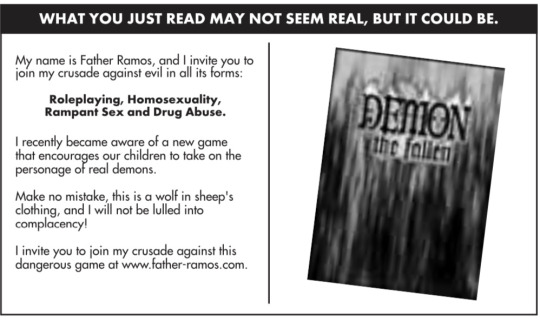
Do you notice anything about it that could prompt further inquiry? What about that URL?
You see, the chick track was only one part of this little marketing stunt.
And so, I ask again, how do you market Demon: the Fallen?
You create an entire fake Evangelical church website called the Eternal Grace Evangelical Church, and write a fake sermon in which you claim that the brand that hired you is producing games that turn children into drug addicts and sexual predators, also claiming that Vampire: the Masquerade was involved in real world murders including the fucking Columbine School Shooting.

Below is a link to the site from the Internet Archives Wayback machine, the main bulk of the interesting stuff is in the sermons section.
Quick note, they used EVERY part of the evangelical bullshit playbook to make this site look legit, they went hard on this. So, the site is satire, but it still feels like it would be a good idea to mention that they satirise everything about Evangelicals, including their homophobic, transphobic, anti-catholic, and anti-pagan beliefs.
https://web.archive.org/web/20031205191032/http://www.father-ramos.com:80/
If you don’t want to read it yourself, here are some actual quotes from this fake Evangelical site that was, and I can’t stress this enough, MADE BY WHITE WOLF TO PROMOTE DEMON: THE FALLEN: (above disclaimer applies here too)
“Eternal Grace Congregation Church is a community of Christians who seek to love, worship and praise Him and to communicate the Word of the Gospel to the world around us while exposing the lifestyles and and recruiting prctices of those deviants who would make this world a place of horrors. Among these are homosexuals, gamblers, drug addicts and role-players.”
“You may find it useful to tell role-players about the Dallas youths who were burned to death in the steam tunnels of Southern Methodist University (of course it was the Methodists) while exploring them for treasure. Tell them about the syphilis-related insanity of Jimmy Cox, a Tennessee teenager who used role-playing games to build around him a coven of homosexuals. Tell them about Michelle Sikes, the Montana role-player who had a sex-change operation. The more perversion you can ascribe to involvement with role-playing the better. You may even wish to fabricate some of your own, to better illustrate the point to your specific at-risk individual.”
“Listening to accounts of the role-players’ games is either the height of tedium (it must be said, pardon my air of judgment) or evinces strong feelings of pity, […] Invitations to participate, if accepted, place the individual in a precarious position himself, and will probably expose him to the scourges of drugs, fornication, homosexuality and Catholicism/paganism in many cases.”
“point out to them that the activity borders on delusion (“You are not an elf, Tommy!”) and heresy (“If God intended for you to act like a demon, he would have made you a demon, Jenny”).”
“In addition, rumors (which is why I relegate this to a side note instead of including it in the main body of my discourse) link the activities of the Columbine high-school “trenchcoat mafia” with Vampires Masquerade.”
“As good Christians, it is obviously our duty to prevent our youth from learning the corrupt ways these books and games teach. Sex, suicide, drug abuse, homosexuality, “golden showers” and many other behaviors proscribed by the Lord and the Good Book come as a result of players taking their games too far. In particular, the moral execration contained with the Demon book takes these aberrations to new levels by openly encouraging players to act in the interests of Satan (or Lucifer, as he is depicted herein).”
“Additionally, role-playing games teach that violence is an acceptable and even admirable way of solving problems. Significant portions of their rules are devoted to combat and weaponry. Demon, for example, also contains systems by which the satanic characters can attack or use magic upon their enemies, with dark arts spawned from Hell itself. These are not unlike the gay community’s reactionary “straight bashing” in response to the more physical efforts of their loving fellows (but loving in the Lord’s intended way) to bring them back into the fold.”
“This Week: Pastor "Father" Ramos discusses the Catholic Church and the 68 Million deaths its evil has caused throughout the world! You won't read this in the history books! Father Ramos also discusses why he has chosen to reclaim the Holy tile"Father" from Catholocism.”
White Wolf was frequently quite edgy, and often wasn’t great at dealing with social issues (you could argue this is still true of the modern World of Darkness in some cases). But honestly I think this is a fun stunt. It mocks evangelicals for all their insane bigoted beliefs, and for basically giving all the stuff they call satanic free advertising. No matter what though this is an unhinged marketing stunt, and it is so wild that they actually did this.
#world of darkness#WoD#Demon: the Fallen#DtF#Demon the fallen#White Wolf#White Wolf Games#a certified themainspoon classic
73 notes
·
View notes
Text
Asterism of an F-Series Ford Pick Up- 17k
Now with BELOVED amv by @butch--dean 🖤
Summary: When you've been to hell, desire is isolating and ugly.
Or: Cas drives his truck for a case and Dean is exceptionally horny about it.
“Once on a hunt when he was a teenager, Dean had been caught too close to an explosive when it had gone off. There had been the moment when the projectile hit, and the moment when it had detonated. And just before it had, there had also been a moment when he had believed that maybe it wouldn’t.
He had thought about that moment for years, over and over again, until something else had taken its place. And the way that that moment was quiet, the way it was still- that is how this feels. To lie beside Cas in the bed of his truck, their shoulders barely touching.”
Follow @deancastruckwip for bonus content <3
Ten Minutes From Home [Lebanon Coda] WIP 30k
We've truly come a long way since the iconic:
"Physically restraining myself from writing a coda fic for Lebanon, where John stays over at the bunker, Cas comes home in the middle of the night & there's tension between him and Dean over whether or not they will still share a room, and then 29-year-old Mary has to sit through Thee most homophobic breakfast with her dead ex-husband, closeted son, and his common law married, ancient eldrich boyfriend."
This fic is a deep dive into some of the juicier elements of Lebanon, including- justice for Mary Winchester and her rich internal life, the intricate dance constructed around Dean's homosexuality and John's neglectful/abusive parenting and the impact of the Michael arc on Dean and Cas' relationship. Also features: recovering!alcoholic dean, a staggering amount of risky bunker sex, biblically accurate sibling interactions, and studies on objectification. Also Sam is practicing witchcraft as a treat, and I put that guy in eating disorder recovery (because he fucking needs it) <3
Haven't started posting this one! But you can follow @lebanon-wip for excerpts, inspo, and bonus content <3
An Easier Softer Way WIP 38k
Recovery!natural. Injured after the hell rescue goes wrong, Dean ends up disabled and living in a small rural town in Eastern Washington. With Sam fucked off to god knows where and without the fight to distract him, Dean has nothing left to focus on but his burgeoning sobriety, and persistent dreams of hell.
Set in the arid low-lands of the river valley, surrounded by apple orchards and twisting irrigation canals, Dean becomes convinced he can see a great beast stalking through the hills bordering the town. The same beast he has dreamt of since returning from hell, the same one he can sometimes feel beside him when he knows that he’s alone.
Walking the line between grief and reality, isolation and community, Dean has to pull together what's real and what isn't as he adjust to his disability, and finds faith that he is capable of building lasting relationships and creating a life for himself worth loving.
Also eventually Cas shows up, and they save the world.
He’s still debating just getting the fuck out of there when a women at the head of the long table clears her throat, and starts to read from a laminated print out.
The edges of Dean’s vision blur out a little. He has to leave. He has to- the woman is still reading. Dean tunes back in in time to hear, “-At some of these we balked. We thought that we could find an easier, softer way. But we could not."
Here, the speaker pauses, and Dean feels like she looks right at him. But she doesn't. She just gives the laminated sheet a little shake, clears her throat and continues, "With all the earnestness at our command, we beg of you to be fearless and thorough from the very start.”
And no one could ever call him a coward. So he stays.
Honestly the most plot I've ever worked with (and very deeply personal) so this one could be a while. @aneasiersofterway for inspo, vibes, and bonus content.
44 notes
·
View notes
Text
City of Depravity
Actually, on the topic of Stampede and the Bible -
In both Japanese and English, the little speech Knives gives before shredding Jeneora Rock is more or less the same at the start, though it differs towards the end - the English dub highlights his god complex a bit more, I think. And "bring everything back to even" in Japanese seems to be a direct manga reference that the English makes more obscure, but in turn the English is more direct about the Biblical part.
Japanese: In the past, God rained fire from the sky, destroying the city of depraved fools. To fix the world once and for all, I’m moving ahead. To bring everything back to even.
English: Long ago, God rained fire onto the city of fools. Destruction was a small price to pay for their depravity. God cleansed what man had sullied, just as I will now. This world will be a blank slate.
At any rate, either way destruction by fire and brimstone as punishment for depravity was the fate of Sodom and Gomorrah. Genesis 19:1, for the curious, though the cities themselves become repeated bywords for the result of inciting God's wrath through the whole rest of the book. (I physically cracked a Bible for the first time in years to check. The brainrot is real.) Specifically, they were punished for their greed, pride, apathy, violence, and poor hospitality towards strangers. God was receiving complaints, and as a sort of final notice sent a pair of angels in the guise of men to locate any virtuous individuals in the cities.
The humans failed this last test, of course. There are differing interpretations why (she said resignedly because she knows people fixate on the homosexuality thing even though it's pretty specious). But in the broader sense, they were buried in fire and brimstone because they wouldn't give up trying to harm the two angels sent to build a case for sparing them.
With the first two episodes of Stampede in mind, I invite some consideration why Knives might have chosen this particular story to precede Jeneora Rock's destruction.
#tristampparty#trigun stampede#trigun meta#tw bible#i guess#what happens when your airbnb gets a few too many one star ratings#i have no idea if that joke is funny#yes knives you read the bible#so did i#and it's not like i'm impressive#i was ten#mini meta
32 notes
·
View notes
Note
You ABSOLUTELY do not have to answer this if you don’t feel comfortable doing so, but what is a “side b” Christian? I tried looking it up but the results were kinda vague :/
Hey, thanks for asking! (this ask is in reference to this post btw)
Okay, so, "side B" is a term that some Christians use to describe how they fit into the wide debate of how the Church should address same-sex attraction and gender dysphoria—basically, how the church should deal with LGBTQ+ issues. The term "side B" is used alongside the terms "Side A" and "Side X", which I'll explain to the best of my knowledge in a moment.
Before I start, though, I'm not an expert on the history of these terms. Here's one source that might get you started, but I have not done extensive research on this, so take this with a grain of salt! <3
Also, note: The topic of transgender people is a little bit blurry in these frameworks, with some people agreeing mostly with one "side" on attraction but agreeing mostly with another on gender dysphoria.
"Side A" Christians (the typically more liberal side) believe that the Bible (and/or God, in cases where people don't believe the Bible is the arbiter of truth) supports LGBTQ+ people acting on same-sex attraction and/or gender dysphoria. So, according to this worldview, same-sex attraction is not a sin; same-sex marriage and relations are not a sin; and so the Church should speak publicly about and embrace LGBTQ+ relationships, transitions, and/or lifestyles. In my experience, Side A Christians usually point out that the Greek word translated "homosexual" in the New Testament refers to pedophiles (instead of?) (as well as?) people living in homosexual relationships. Again, though, I haven't done full research on that one.
"Side X" Christians (the typically more conservative side) believe that same-sex attraction and gender dysphoria are sins, and that therefore the Church should not speak about and/or should completely denounce same-sex attraction and gender dysphoria. They may believe in what's sometimes called "Pray the Gay Away": the belief that if you have enough faith in God and/or pray hard enough, He will take away your same-sex attraction and/or gender dysphoria.
"Side B" Christians believe that the Bible says that all people struggle with temptations to sin, including, for some, sexual attraction to the same sex and/or gender dysphoria, and so the Church should not deny that these struggles exist or act like the people who struggle with them are any worse than anyone struggling with heterosexual lust or any other sin—but that the Bible also has a clearly stated framework that Christian marriages should fit into: one man and one woman, having sex only in a marriage. Side B Christians typically believe that the Church should not ignore the fact that there are LGBT+ Christians, nor should it embrace same-sex relations. Instead, it should acknowledge the struggle of having same-sex attraction and/or gender dysphoria and provide compassion, give life direction that is toward God and not toward the world, and just... you know... not isolate and whisper about such Christians like they're any worse than anyone struggling with, like, selfishness or jealousy or gambling or addiction or any other desire of the flesh.
EDIT: A Side B perspective typically does not state that attraction or dysphoria themselves are sins. Those are temptations (and/or struggles), and like the post linked here (this post) says, temptation is not the same as sin (acting on temptation).
Yeah, personally, I agree most with the Side B perspective. It seems the most Biblically sound perspective to me.
"Side A" and "Side B" are usually descriptors used only by Christians who identify with LGBTQ+ attraction and/or gender identity. So, people may call themselves "Side B bi", for example, as a shorthand for saying "I'm attracted to both genders, but I believe that it is only okay to have sex under the Biblical marriage framework". But I find the terms "Side A" and "Side B" a useful framework to describe worldviews in general, even for heterosexual people who identify with their biological sex. Use your own discretion about that one. I personally sometimes call myself "Side B" out of convenience, although I don't have same-sex attraction, but I strive to be respectful and compassionate to those who use "Side B" to indicate that they personally struggle with same sex attraction, and so I don't go throwing the term around willy-nilly. By the way, I do technically fall under the LGBTQIA+ umbrella: aromantic asexual here (although I hold those terms loosely) with a history of mild gender dysphoria.
"Side A", "Side B", and "Side X" are simply convenient terms for broad views on sexual morality and Christian perspectives on LGBTQ+ issues. I use them when they're convenient, but strive to meet every individual person and converse with people, not broad "sides", learning how each person interprets the Bible and what their individual church history and personal context is in order to learn how they think about Biblical, Christian, social, and LGBTQ+ issues. I find that the individual conversations are far more productive and less divisive than arguing along "party lines".
134 notes
·
View notes
Text
nobody could decide which stories they wanted me to share. they want me to share all of them 😭😭
i’ll start with jesus and john and why i think they’re gay for each other, supported by biblical evidence provided by Seton Catholic Homeschooling of America.
• i took this course in my tenth grade year. i was only homeschooled for 9th and 10th grade. i was public schooled before then, and later went to boarding school for my last two years of hs. but that’s another post.
this is a long post. buckle in. i’ll have it all below the cut
• i no longer have the textbook title, and only have pictures from this text book that i took in a delusional haze when reading this in my catholic mother’s household, hoping that she wouldn’t look through my phones photos to find these images.
this is all from a catholic standpoint, other forms of christianity are not accounted for. if you do not want to see GAY CONTENT ABOUT JESUS, move along
this post is about to unlock so much of my old hyperfixation on the catholic church that i had before leaving.
first of all, as backstory for those who don’t know john:
• john is one of jesus’ twelve disciples and wrote the Gospel of John (I, II, and III) which is a hella important book in the new testament (the second half of the bible.)
• the books of john tell the story of jesus’ life from birth to death. now, that’s kinda gay to write about another man that much, hmm.
• john has also earned the affectionate title of: “The Beloved Disciple”
• he is also traditionally credited with writing Revelations (also known as Apocalypse, which tells how the world is gonna end. fun right!!), though scholars are unsure if he wrote it, or a different john wrote it.
okay, now onto the gay stuff:
• most people jokingly ship judas and jesus because of the angst of judas’ betrayal to jesus. however, i disagree.
• though, knowing their ages, shipping jesus and john would be quite problematic these days, it was quite an acceptable age gap back then. jesus was around the ages of 30-33 at the time of his death, and john was a young adult, about 18. (yikes)
• my evidence begins with the way john writes about himself and jesus in the Gospel of John. in his gospel, he never calls himself john. you guys know what he calls himself in his gospel?? “the discipline whom jesus loved”
😐
sir. could you be ANY more obvious??
so far, all of this info is directly from my catholic textbook.

WOW! that page unpacks a lot. let me elaborate on the way john leaned up on jesus’ chest. first of all, that’s a real bible quote. let’s go:
John 13:23-25
• “23 One of his disciples, the one Jesus loved, was at the table to the right of Jesus in a place of honor. 24 So Simon Peter gestured to this disciple to ask Jesus who it was he was referring to. 25 Then the disciple whom Jesus loved leaned back against Jesus’ chest”
the passage then goes on to john (the disciple whom jesus loved) asking jesus who’s gonna betray him.
• to FURTHER add to this gay af moment, there are PAINTINGS of it, completed by MULTIPLE artists. i’m going to provide the image in my textbook, and then images found online that i particularly enjoy.
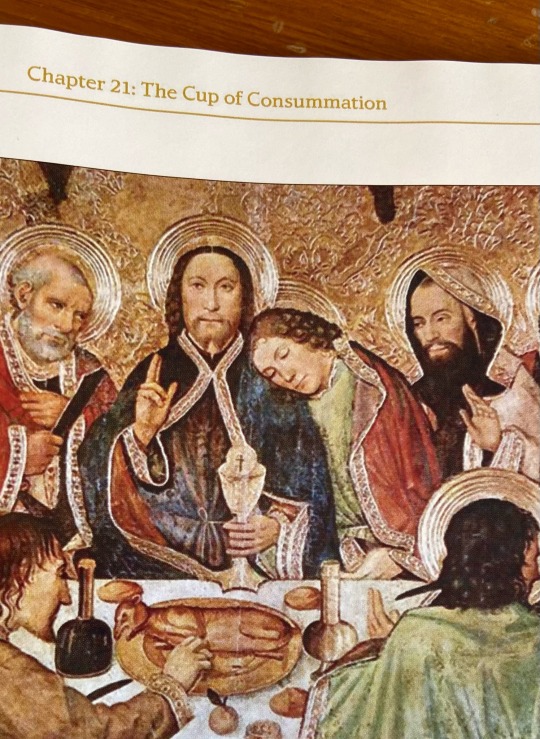
above: lovely image! i cannot remember the artist for the life of me.

above: Jesus and John at the Last Supper by Valentin de Boulonge
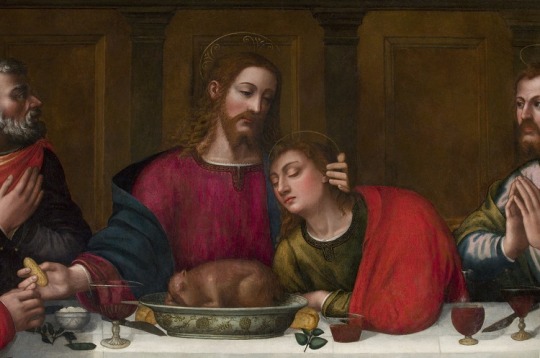
above: Last Supper by Plautilla Nelli (portions of the image were cropped)

above: cannot find artist’s name.
• if you are interested in finding hundreds more of images like this, all you need to type into google is “john leaning on jesus”. you’ll get the images you need. trust me
• those were my largest pieces of evidence, but there are smaller ones i’d like to share. the textbook helped “gay it up”. i think the author of this textbook was a closeted homosexual. cause no way did a straight person write this thinking “hmmm that’s totally platonic and not at all queer, cause that’s how i feel about MY best friend.”
here’s direct textbook images:
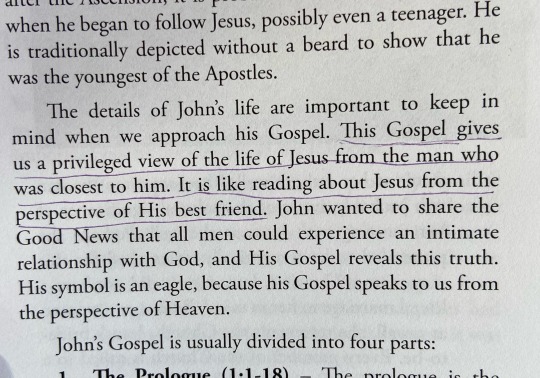
• hmmm man who was closest to him you say???
• “intimate relationship with God”
• best friend? 🤔 are we sure about that?
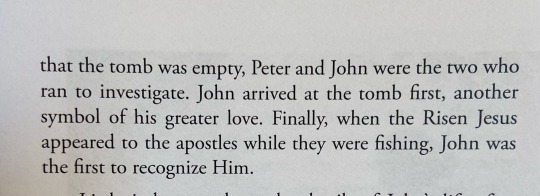
• symbol of his greater love?
• AND he was the first to recognize jesus??
• y’all. they’ve got to be shitting me atp. no way were they not In Love
and finally, from my study questions:
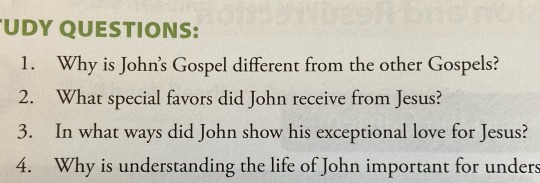
y’all. special favors? exceptional love?
this textbook had me GOBSMACKED. jaw DROPPED. WDYM THAT JESUS AND JOHN WERE DEFINITELY IN LOVE???
conclusion:
• i HIGHLY recommend you looking up more pictures of john laying on jesus.
• i think of john/jesus as canon. there’s too much evidence to support my point. including The Bible. judas/jesus is like what fanfics are for. they’re the pair that everyone wishes happened in canon, but the authors sucked, so it didn’t.
• literally, drop any questions in the reblogs and comments. i’ll be HAPPY to answer.
(and jesus/judas shippers, i hope i changed your mind.)
#jesus x john#jesus x judas#anti catholic#anti christianity#(putting those in so catholics can filter this post out)#last supper#valentin de boulogne#ex christian#ex catholic#anti religion#ex religious
10 notes
·
View notes
Note
Honestly I admire you so much for writing and publishing something that most people wouldn’t have the courage to. Showing God and angels under such a light has been taboo for so long, I’m glad a lot of indies are venturing into the territory now. But still I hope the negativity you’ve gotten hasn’t been too much. Hope you have a lovely day!
Aghh thank you! I don't really see it as courage, at least for me — I think I'm just being short sided and a bit dumb.
Regardless, it's always shocked me that biblical angels being explicitly queer/gay is something nobody seemed to treat seriously (until recently). It's in Paradise Lost!! Even a major component of understanding homosexuality as presented in the Bible involves angels!!!!!! (Sodom) And about God — it's odd because I don't even think I'm misrepresenting him necessarily. God is quite capable of horrible things in the Bible; actually, I think if would be insulting to the Christian God for him to be treated like there is anything he can't or won't do.
You're supposed to fear him! Love, yes, but also fear!
I'm also really glad for the world of indies. It's a really nice anti-censorship space (for the most part) where I've seen such great work recently in this realm of more "blasphemous" literature. It's also a place where I think a lot of authors are so sincere and raw, and I love to read their work.
The negativity doesn't get to me anymore. I'm really grateful ultimately. I recieve a lot more love than hate, and it makes me really thankful that I got so lucky.
Admiration might be a bit much — I am just a guy — but thank you very much. Sending you love, and I hope you have a wonderful week! :') <3
25 notes
·
View notes
Note
Hey!
I was raised aetheist, and I never really realised how badly Christianity could screw people up. There were some people in my extended family who were religious, but it was always just this vague distant thing that existed on the periphary. The only times I entered churches were in a touristy way, and only then because my mum dragged me into them - I've always hated churches, they have bad vibes.
Then I met my best friend who was raised in a religious family, and they described a lot of the strange, disturbing rituals they would perform in church. Around the same time, I began watching a content creator who was raised in a religious family and was going through the process of reconciling their religious upbringing with their homosexuality.
Since then, I've been really fascinated by how this religion can screw people up and make people doubt their entire being. I think a lot about how on earth this one religion - or cult - from a city thousands of years ago became so persistent and all encompassing.
I was wondering, what do you know about the real-world history of the Christian religion and Jesus? One can assume that Jesus was a real person, but what are the details? Was he a cult leader? A rebel? Both? How did he make people believe he was a prohpet? Why did he make people believe he was a prophet? I'm fascinated by the real historical events that occurred to create such a long-lived ripple effect, but I'm cautious of researching "religious history" on my own because I don't know how to avoid the many dangerous people one would be likely to come across in that feild. Do you have any knowledge to share?
-🟪
My favorite biblical historian is Dr. Bart Ehrman (link to his website). He’s a former Christian, current agnostic which I think gives him a balanced view of biblical history. He talks about what it was like to believe in the Christian story, what it was like to figure out what is real and what isn’t, and what actual biblical scholarship should look like. His books helped me disentangle the complicated stories around Jesus and develop my own sense of scholarship.
Most historians believe that Jesus was a real person who existed around the same time and place as was claimed in the Bible. We have no eye witness testimony about anything Jesus said or did. All we have are copies of copies of legends that people wrote about him decades after his death. We have no real way of knowing what Jesus thought about himself or what he claimed to be.
That being said, we can try to understand the traditions of the stories told about Jesus. I’ve heard a lot of fundamentalists claim to be going back to the “early Christian church” but there were so, so many traditions that sprang up around the story of Jesus all believing different theologies. For example, early Christian mysticism is a weird, wild rabbit hole to go down if you’re ever curious.
We can try to understand the man that Jesus was by looking at the stories told about him. These stories were based in apocalypticism under Roman rule: the belief that the end would come, but hey at least it would free people from Roman tyranny. Jesus was an apocalyptic preacher whose death caused shockwaves of grief among his followers. I do believe that he made promises about the coming kingdom and when those promises were suddenly impossible after he was killed by his government, his followers found a way to make those promises relevant again in their own minds.
I find this stuff interesting, but I really wish that this specific history didn’t affect people’s lives in the modern world. I wish it were just a weird history niche instead of a direct threat to people’s wellbeing. Being hesitant to research biblical history makes sense. There’s a lot of nonsense out there to dig through and it can be exhausting. Take care of yourself first. Biblical history is not as important as your wellbeing. But if you do enjoy researching, have at it! Find people that you respect, hold on to ideas loosely so you critically evaluate them, and be ready to take a break if you burn out.
18 notes
·
View notes
Text



More BA Thesis work this afternoon. I have a meeting with my advisor in twenty minutes so I am taking a break.
After this meeting I plan to go home and get some much-needed housework done. Also probably some guitar practice.
#ba thesis#homosexuality in the biblical world#aelstudies#dark academia#dark academia aesthetic#study motivation#studyblr#university studyspo#university studyblr#university
42 notes
·
View notes
Note
ok. ok. i have only seen DB/DBZ/DBS and have not reached GT yet (working on it ......) so mmy understanding of adult goten is from the perspective of somebody who has watched broly second coming on loop and replays the first episode of super like a healthy individual & has seen like 3 screencaps of gt goten. also that one goten side mission from Kakarot for the Play Station Five(5). anywayz. about the threeway you propose in your post. now assuming we live in a beautiful world where akira toriyama is introduced to the concept of polyamory and 1) thinks its banging and 2) accepts homosexuality into his heart of hearts (aka we are no longer operating by feasible canon standards) i do think it is PLAUSIBLE. ebcause. here is da thing. in PREMISE 7 you state Trunks is competition BUT (and again.......maybe GT would contradict this....all i know is my beautiful world where trunks pisses on broly) i think he only views trunks in competition for like...normie things. in Kakarot there's this exchange between the two of them, where Trunks (speaking for the both of them) says smth like, "we're not RIVALS that's LAME. We like competing but we're FRIENDS." (<- he then goes on to dunk on his father because "you're friends with goten's dad, right?? you're not RIVALS are you? that's TOTALLY uncool... you lamer.") and while i acknowledge this is New Canon (DBS-era where trunks's "13yr old on xbox live saying slurs" personality got nerfed a tiny bit) i think it says a lot about how they view competition/rivalry between them. It's like, all fun and games and a drive to be better but it's nothing they're losing sleep over unlike whatever da faq vegeta has going on with goku. this is all to say i don't think goten sees trunks as romantic competition. if anything he probably trusts trunks wouldnt like cheat on his girlfriend or whatever. now idk if goten would have hangups abt a 3-way being bizarre to him or smth but knowing how cra-zay and adventurous that little man is i assume it's something he would TRY at least, like, posing it as a joke like "haha could u imagine..." but its obvious he's like, trying to present it as a valid concept to trunks. the unspoken conclusion of "it could be kinda epic doe" is loud and clear 2 trunks. i think the better question is would palace be cool with this. would she do this. it's trunks briefs of capsule corp so like, if you were a worser person you could be like, hell yeah im fuckin that man if my bf gives me the green light i want tobe able to say that i know mr. trunks briefs biblically. but at the same time thats like, mean. i dont know much abt her but she seems like a sweet gal i think she wouldnt do something just for #bragging rights u kno....but u would know more on that methinks.
by the way you should watch the solar entertainment dub of broly 2 & 3 if you haven't they are life changing.
FASCINATING AND POWERFUL ARGUMENT.
I Didnt Fucking Know That TRunks Said That Shit & I Went and Found it on DA YOUTUBE!!! Timestamped video below but below that I will also attach screenshots of the whole scene but TBH I WATCHED THE WHOLE VIDEO AND IT'S PROFOUNDLY ADORABLE & PERFECT
youtube

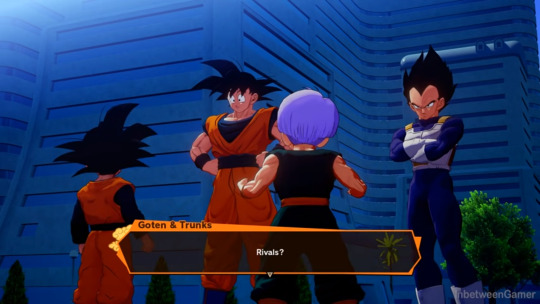
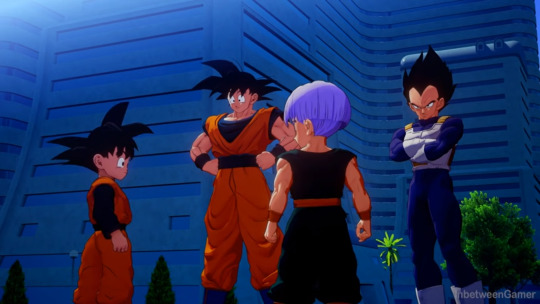

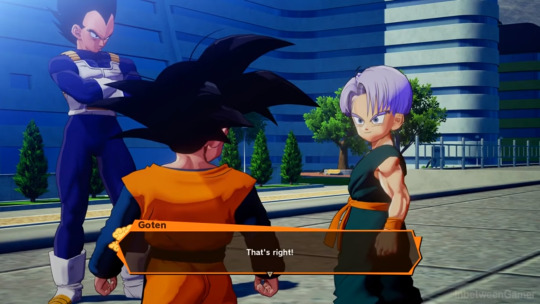
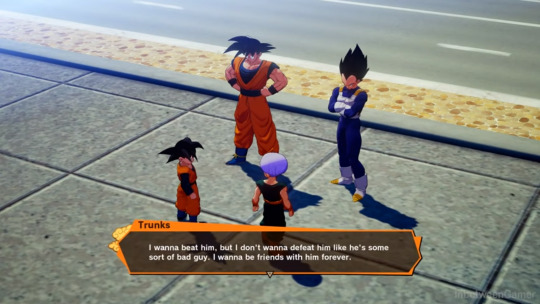
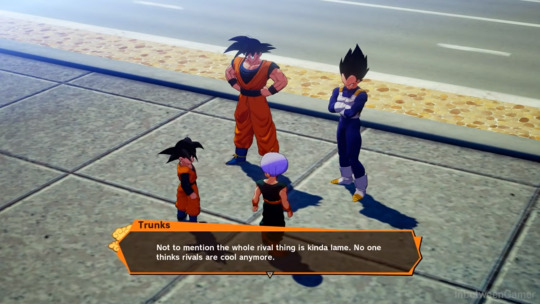

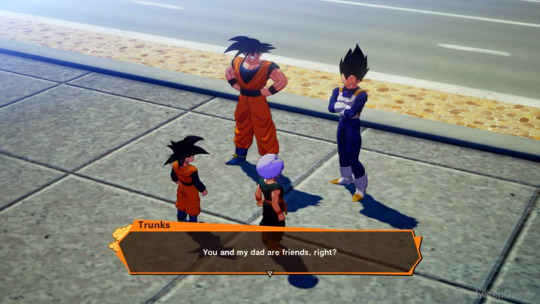
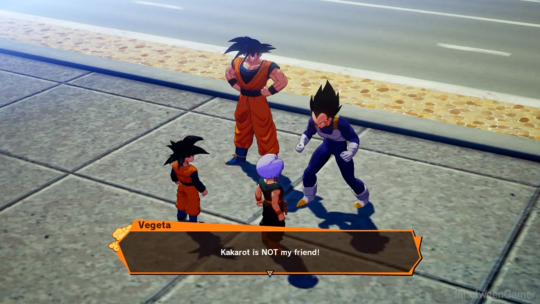
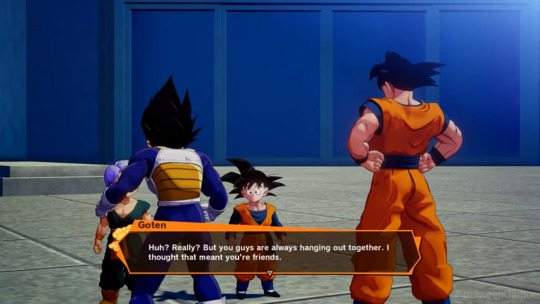


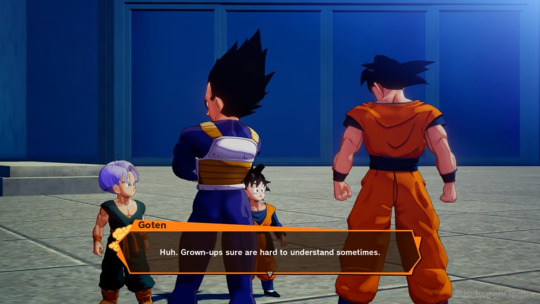
Trunks said that he wanted to be friendas eith Goten for FOREVER .. He didnt stop at merely commenting on the present, but he had the confidence to project his feelings into the future: He's friends with Goten, he wants to continue being friends with Goten, and he wants it to be for forever.
I mean piece and signerture done right there. Signed sealed & delivered. Closed case. I'm willing to accept this as a total refutation for Premise 7 and what i was getting at in that post in general. Trunks looks at Goten with genuine appreciation when he said that they were friends
Ohhhgm my god and this video is so adorable .. I've said this before but as much as i love madness I also LOVE LOVE LOVE LOVE So Much how on dragon ball everyone is depicted as truly happy healthy open free and LOVING EACH OTHER. Trunks and Goten just wanted to spend time with their fathers whom they love so much. They both assumed that their fathers loved each other as much as goten and trunks themselves love each other. They thought that the world was just that beautiful and lively. Also Gotenks in this video is 101% perfect and he is exactly swag and epic as i hoped he would be and it's really remarkable stuff. Great video. Great footage. Great writing
It is true that this is, as you put it: "New Canon (DBS-era where trunks's '13yr old on xbox live saying slurs' personality got nerfed a tiny bit)." But I dont honestly trhink that that's THAT relevant becasue what we mostly saw of Goten & Trunks in DBZ was friendly fun anyway, just with a bit of teeth, and then in DBGT Trunks is totallllyyyy chilled tf OUT and we don't see any acidity from him ever I think. So the fact that he's not saying slurs in DBS is I think okay. (I am actually greatly intrigued by his personality in DBS becasue I believe that it offers a great transition into the eventual DBGT and becasue it offers A LOT of insight on his Nature and his Nurture. Now is not the time.)
OK back to the aspect of the post that is about the throuple with Palace. This here ask offers the perspective that if Trunks sort of entered the relationship, then Goten wouldn't take it as striaght up competeition, but instead it would be sort of like "Ok well you know what You're a good man. I trust you'll treat her well." And in fact perhaps Goten & Trunks AREN'T Sick to Bastard Death ofn each other by now and ARE in fcat FRIENDS FOREVER like Trunks wishes for in this Kakarot for the ps5 footage.
This ask also offers the third propositon that Goten & Trunks may consider the prospect of a threeway involving them and one nice woman to be "kinda epic." No comments on that one
Palace definitely is not a bragging-rights kind of person so her motivations would literally be becasue she loves love and she loves Goten and she loves that he has a best friend and that they love each other and maybe she thinks that trunks is cute becasue hes so polite around her. Or maybe she thinks he looks sad and she wants to do something about it. But she has also been shown to enjoy badboys against her better judgement. Just remembered that. Wonder if we could work that in somehow
I don't member what movies I've seen or haven't seen but I'll keep that in mind chief. It's a beauotufl world ...
END POST
10 notes
·
View notes
Text
Queerness and the Bible
Okay, before we can dig into the meat of this we have to address what the Bible/Scripture is and is not. Since it is the only source that we will be using during this discussion. These passages aren’t going to be dug into as deeply as the rest, because it’s not what we are here to talk about, but rather the setup to understanding what the Bible says about queerness and queer relationships.
That being said this discussion will keep two main ideas in mind; that Scripture (the Bible) is sanctified and set apart by God, that being his word given to the Christian community, and that it is not to be read or interpreted through the men who penned it and translated it but through the Holy Spirit.
This is something based in Scripture itself, as Paul says in II Timothy 3:16-17 “All Scripture is given by inspiration of God, and is profitable for doctrine, for reproof, for correction, for instruction in righteousness, that the man of God may be complete, thoroughly equipped for every good work.” Which isn’t the only claim to Scripture being directly from God, as John claims (John 1:1) that “In the beginning was the Word, and the Word was with God, and the Word was God.” This concept of the Scriptures being inseparable from God and being a tool of God follows in many letters and books of the Bible. Isaiah records that not only is the scripture from God (and his word directly to his people) but that the Spirit would gather the Scriptures together and keep them for all future generations (Isaiah 34:16-17). Furthermore, the New Testament puts a heavy emphasis on the Scriptures being read and understood “only” through the Holy Spirit. 1 Corinthians 2:10-12 saying that “but God has revealed them to us through His Spirit. For the Spirit searches all things, yes, the deep things of God. For what man knows the things of a man except the spirit of the man which is in him? Even so no one knows the things of God except the Spirit of God. Now we have received, not the spirit of the world, but the Spirit who is from God, that we might know the things that have been freely given to us by God.” Meaning that only the Holy Spirit can know the meaning of the Scriptures. So only a Christian who is using the Spirit to interpret these verses can know God’s intentions and meaning behind them. (Further verses that discuss the Spirit as the means of understanding Scripture; Luke 24:45 and Ephesians 3:16-19)
So in short, Scripture is given by God and set apart for instruction. However, it is not untouched by man’s failings and biases. As Paul says in Romans 3:23 “-all have sinned and fall short of the glory of God”. Meaning all those who transcribed, instructed or translated the Bible are as susceptible to biases and sin as anyone interpreting the scriptures today.
Now to address the Scriptures that reference homosexuality or supposedly reference homosexuality (as there are both). To approach these verses one has to take a look at the larger picture of what is being said. By asking a few simple questions about the author of the verses and the time and settings in which they were written.
One of the most often cited scriptures and biblical stories used to condemn homosexuality is that of Sodom and Gomorrah. Which is at its core a story of a group of people who committed many sins, brazenly and unrepentant. It chronicles two angels who visit Sodom to test the inhabitants, for if they find even ten righteous people it will be spared God’s wrath. Upon entering Sodom the angels are only met with the hospitality of one man, Lot, who welcomes them into his home so they don’t sleep on the streets. Then the rest of the town shows outside his door to demand he hand them over so they can rape them. Which in itself is a sin, fornication. This story incorrectly claims the city’s sin as homosexuality, because Lot is seen as “righteous” and spared from the destruction of Sodom, because he offered his daughters to be raped instead of the masculine presenting angels. But this is challenged by Ezekiel 16:49-50 which says “-this was the iniquity of your sister Sodom: She and her daughter had pride, fullness of food, and abundance of idleness; neither did she strengthen the hand of the poor and needy. And they were haughty and committed abomination before Me; therefore I took them away as I saw fit.” Which lays the claim of inhospitality being Sodom’s major sin, not actually the fact they would prefer to commit violence against strange men than Lot’s daughters. While Jude 1:7 is also cited as anti-homosexual it says “Sodom and Gomorrah, and the cities around them in a similar manner to these, having given themselves over to sexual immorality and gone after strange flesh, are set forth as an example, suffering the vengeance of eternal fire”. Sexual immorality includes all the sexual sins, that being any sexual relations that defy the laws of God. Since Sodom attempted to gang rape strangers they were not married to they were meeting a lot of biblical requirements for sexual immorality. As for “strange flesh” it is discussing the lust they felt for angels, which is warned against in Genesis 6:1-4, human and Angel relations remove man from God’s favor and it is considered evil in his eyes. Meaning that there is no direct claim to homosexuality being a sin in these verses, only an interpretation taken by readers and then passed down and taught throughout the years. Which of course impacted a lot of the writings of later prophets and disciples.
The next passage that shows up in the Old Testament is Leviticus 18:22 “You shall not lie with a male as with a woman. It is an abomination”. Now at first glance this is very straightforward, it is a direct statement that paints a clear picture of homosexuality and marks it as a sin. But this can quickly change with a look at the entire book of Leviticus, its intended purpose and an understanding of the culture and historical setting in which this particular book of laws was written down. Now to understand Leviticus, as with a lot of the Old Testament scriptures, it has to be acknowledged that they were in part passed down orally for generations. Though Leviticus was written down in part, most of it spent hundreds of years being passed down orally, and undoubtedly shifting with the culture and time. The laws in Leviticus are the old covenant that the coming of the Messiah dissolved in place of the new covenant, now this doesn’t necessarily wipe away all the importance of the old covenant or make it insubstantial. What it does say though is that the old covenant was designed specifically for a separate people group with different stumbling blocks laid at their feet as a lot of these laws can be traced back to being protections for the Israelites.
Leviticus 18:22 specifically addresses pagan practices or religious practices of non-Jewish people groups in the surrounding area. This is in part because Leviticus is written for the tribe of Levi, the priestly tribe. This passage is specifically designed to set God’s priests apart from priests of different religions, which is something the scriptures take very seriously. Furthermore, this rule book lays out many laws that are not upheld today, or even truly held as sins. Amongst them wearing fabrics with multiple fibers, having sex while menstruating or with a menstruating person, cross breeding livestock, sowing fields with multiple seeds, or cutting the hair off the sides of the head. These are all held as being part of the old covenant, meaning that any laws in this book not repeated in the new covenant should be held to the same standard. Leviticus also brings up same sex relations in 20:13 “If a man lies with a male as he lies with a woman, both of them have committed an abomination. They shall surely be put to death. Their blood shall be upon them.” This verse isn’t specifically addressed to the priesthood, however it is a part of the covenant made for the Israelites who were fleeing persecution on their way to a new land. These laws were devised to create their best survival and strength, which in part relied on procreation. Which could attribute to all the discussions in this passage about incest and not sleeping with a menstrating woman (as that is when a woman is usually least fertile). Also, it’s worth a note that this passage reflects and is in almost the exact order of Leviticus 18:22, which could be a sign of oral repetition as well as the cultural impact of the views of Sodom and Gomorrah.
Which leads us into the New Testament and the new covenant with God. Now some verses from the gospels are used in arguments to claim homosexuality is unnatural, but these verses are specifically addressing marriage and more importantly are discussing the first marriage. That being Adam and Eve, who were created male and female for procreation purposes. These scriptures can be found in Matthew 19:4-6 and Mark 10:6-9. These are less consequential in the discussion of homosexuality being a sin as they are verbal quotations of Genesis in the discussion of biblical marriage. It’s worth noting that Genesis 1:27 says that “-God created man in His own image; in the image of God He created him; male and female He created them.” Meaning that both man and woman are in his image, therefore He has neither sex and His image is less about physical form then spirit. Furthermore, Adam and Eve were created with procreation in mind, Genesis 1:28a “then God blessed them, and God said to them, Be fruitful and multiply; fill the earth and subdue it.” Leaving the first marriage as a means of procreation rather than a specific role model of all future marriages. Neither is Jesus referencing the Torah in a conversation about divorce him condemning homosexuality.
Every reference to homosexuality in the New Testament was penned by Paul and (possibly) his followers. Which in respect to him and his apprentices having assumed authorship of nearly half of the New Testament isn’t too much of a shock. Though it brings into question who Paul was and his personal biases and contradictions throughout his works, as well as his intended meaning behind these verses. Paul the apostle originally studied as a Pharisee and was one of the most active against the early Christian church, persecuting followers of Jesus. Acts 22:3-4 Paul says that “I am indeed a Jew, born in Tarsus of Cilicia, but brought up in this city at the feet of Gamaliel, taught according to the strictness of our fathers’ law, and was zealous toward God as you all are today. I persecuted this Way to the death, binding and delivering into prisons both men and women.” This reflects both his early strong convictions to the Torah and oral Jewish teachings, as well as his strong convictions in what he believes. These qualities aren’t depicted as having shifted with his conversion to Christianity outside of his view of outsiders softening (which can be seen through his work to carve space for the gentile Christian in the church). Which left Paul as not only well educated on the Jewish teachings of the time but very familiar with the pentateuch and the oral teachings that surrounded it.
Now, a quick look at Paul’s contemporary Jewish philosopher's teachings and translations of the Torah can help inform how Paul’s steadfastness could have viewed homosexual relations. The teachings of Philo, that echoes the passages in Leviticus on homosexuality being an abomination, and asserting that the death penalty should be enforced. This reflects the understanding of the Torah at this time, something Paul would have been familiar with as he studied the Torah and other Jewish teachings. Which leaves the conversation of what Paul’s stance would have been on homosexuality based on the culture of the time, since his peers all viewed homosexuality as sin deserving of death. Which arguably Paul agrees with in Romans 1:26-28 “For this reason God gave them up to vile passions. For even their women exchanged the natural use for what is against nature. Likewise also the men, leaving the natural use of the woman, burned in their lust for one another, men with men committing what is shameful, and receiving in themselves the penalty of their error which was due. And even as they did not like to retain God in their knowledge, God gave them over to a debased mind, to do those things which are not fitting”. At first glance this passage condemns homosexuality in clear and certain terms. However, Paul’s letter continues to the Romans and explains that these sins and judgements are from man. He further asserts that “-you are inexcusable, O man, whoever you are who judge, for in whatever you judge another you condemn yourself; for you who judge practice the same things” (Romans 2:1). He informs the church at Rome, and specifically the Jewish Christian’s, that they are in fact as accountable for their sin as the gentiles. Then he informs them God is the one who decides final judgment and not them. Which leaves a few separate ideas to be examined, the first being that Paul references a sin that the Jewish community holds as particularly detestable and the second being his references to pagan worship and practices.
Paul uses the interpretation of the Torah on homosexuality to paint a picture of sin that is deserving of death to then claim that the church itself has committed the same crimes. Leaving Paul with the claim that all sin is the same in God’s eyes and that even something they the community held as so detestable is capable of forgiveness. In this he repeats that there is none righteous among mankind, which echoes the story of Sodom itself in the infliction of God’s wrath, while preaching hope through the new covenant made through Jesus’s death and resurrection. Now, this can be viewed as the claim that homosexuality is a sin that is forgivable (as with all sin) or rather the current views on homosexuality being used to make a stark contrast to drive home his point. In addition, there is reason to believe this reference to perceived homosexuality was in fact discussing pagan rituals. These rituals were common in Corinth (the city in which Paul wrote the letter to Rome from) as well as throughout the Greek world. The verses before the “condemnation” of homosexuality paint the picture of what specifically Paul is addressing, Romans 1:23-25 “{they} changed the glory of the incorruptible God into an image made like corruptible man—and birds and four-footed animals and creeping things. Therefore God also gave them up to uncleanness, in the lusts of their hearts, to dishonor their bodies among themselves, who exchanged the truth of God for the lie, and worshiped and served the creature rather than the Creator, who is blessed forever. Amen.” These pagan rituals would have included temple prostitution as well as pederasty (sexual relationship between an adult man and a young boy). So instead of Paul asserting that homosexuality is a sin, he is addressing the idolatry that surrounded him and the church. A warning that reappears throughout the New Testament. So if his words here are to be taken as any sort of moral judgment (which he himself warns against in the passage) it is against pagan practices and not homosexual orientation.
Paul writes to the church in Corinth that “do you not know that the unrighteous will not inherit the kingdom of God? Do not be deceived. Neither fornicators, nor idolaters, nor adulterers, nor homosexuals, nor sodomites, nor thieves, nor covetous, nor drunkards, nor revilers, nor extortioners will inherit the kingdom of God. And such were some of you. But you were washed, but you were sanctified, but you were justified in the name of the Lord Jesus and by the Spirit of our God (1 Corinthians 6:9-11)”. Which has sparked many debates about translations and intended meanings. It’s argued the best translation reflects the above mentioned temple prostitution and pederasty. However, even if this is not the case any list of sins being compiled by a man will hold biases from their lived experiences and fears. And what we know about Paul suggests he would hold homophobic views, that would include the idea of being on the receiving end of homosexual sex as demasculinizing. From all his writings it’s easy to see that he viewed women as lesser (possibly why some translations translate effeminate in place of homosexual/sodomite) so anything that compromised his ideas of masculinity would make those men fall into a lesser social class. This is something that would compromise his ability to make a truly detached analysis of homosexuality. This same translation discussion applies to the use of the same words in 1 Timothy 1:8-11 “but we know that the law is good if one uses it lawfully, knowing this: that the law is not made for a righteous person, but for the lawless and insubordinate, for the ungodly and for sinners, for the unholy and profane, for murderers of fathers and murderers of mothers, for manslayers, for fornicators, for sodomites, for kidnappers, for liars, for perjurers, and if there is any other thing that is contrary to sound doctrine”. In addition, these translations are based on a word that Paul seemingly created, that being arsenokoitai. Which translates most accurately as pertaining to the previously discussed pederasty. Also, of note, 1 Timothy is considered to be possibly written by followers of Paul after his death. Which would explain the word being used out of the same context found in Romans and Corinthians, as it relies on not only Paul’s interpretations of the Torah but on his followers interpretations of his letters.
This leaves to question whether this analysis falls under the concept of the Spirit revealing God’s intent or the bending of scriptures to follow sinful desires. Which leaves another concept to be explored, that being scripture that shows support of homosexuality and queerness. This won’t be any verse that specifies homosexuality since the concept of sexual orientation wasn’t something that would have been mainstream during the periods in which these letters and accounts were written. Instead they will be verses that discuss sexual otherness and love.
The Bible puts a heavy emphasis on love and its importance to Christianity. 1 John 4:7 “Beloved, let us love one another, for love is of God; and everyone who loves is born of God and knows God”. Meaning that all love is from God and a mirror of his image. Some people will falsely claim that queer love would not be real love, that it is lustful and sinful desire instead. However, the scriptures defines love in 1 Corinthians 13:4-7 “love suffers long and is kind; love does not envy; love does not parade itself, is not puffed up; does not behave rudely, does not seek its own, is not provoked, thinks no evil; does not rejoice in iniquity, but rejoices in the truth; bears all things, believes all things, hopes all things, endures all things”. This definition supports homosexual and heterosexual relationships, because it gives criteria that are met in a lot of long lasting and forgiving relationships. Furthermore, the couples who had to stick out for so long in a world where their relationships would never be acknowledged or the marriages legally allowed have shown more long suffering than most.
In addition to homosexual love being from God there has always been a place for the sexually other inside of the church. During the times in which the church was first being founded one of the most prominent sexually othered members of society were eunuchs (men who have been castrated) as they were viewed as having a lesser social status. This being in part because of their removal of their sexual organs and in part the absence of sexual desire. Not all of these men became eunuchs willingly or for religious reasons. As Jesus says in Matthew 19:11-12 (in response to the disciples saying celibacy was better than marriage) “All cannot accept this saying, but only those to whom it has been given: For there are eunuchs who were born thus from their mother’s womb, and there are eunuchs who were made eunuchs by men, and there are eunuchs who have made themselves eunuchs for the kingdom of heaven’s sake. He who is able to accept it, let him accept it”. Reflecting the differences between eunuchs who did not (or did not want) sexuality or desire, court eunuchs and intersex individuals. These people were decidedly queer in their day and age, from reception socially to their experiences of sexuality and sexual desire. Furthermore, the scriptures take similar contradictions on their existence. Deuteronomy 23:1 says that “he who is emasculated by crushing or mutilation shall not enter the assembly of the Lord”, meaning that eunuchs weren’t allowed near the presence of God (or the physically deformed, see Leviticus 21:20). While other scriptures say the opposite, Isaiah 56:4-5 “for thus says the Lord: ‘to the eunuchs who keep My Sabbaths, and choose what pleases Me, and hold fast My covenant, even to them I will give in My house and within My walls a place and a name better than that of sons and daughters; I will give them an everlasting name that shall not be cut off”. Which not only offers them a place in heaven but a highly revered place. This is the sentiment that is continued by Jesus and his disciples, and part of the foundations of the Christian church. This can be seen in Acts 8 when Philip preaches the gospel to an Ethiopian eunuch who converts to Christianity, professing Jesus as his savior. The eunuch is then baptized in Acts 8:38 “so he commanded the chariot to stand still. And both Philip and the eunuch went down into the water, and he baptized him”. This baptism officially making the eunuch part of the Christian church as it symbolized the death and resurrection of Jesus Christ.
Furthermore, the old covenant has gone away as depicted in Acts 10:15 “then he said to them, You know how unlawful it is for a Jewish man to keep company with or go to one of another nation. But God has shown me that I should not call any man common or unclean”. This is the final conclusion that Peter has about his vision of God telling him to break the old covenant by eating meat that was considered unclean by the Torah. He asserts that there is no man inherently unclean by the nature of creation, that the old laws built to protect the Israelites do not apply the same way to the Christian church or the world they live in after Christ. In addition, Paul says in Galatians 3:26-29 “for you are all sons of God through faith in Christ Jesus. For as many of you as were baptized into Christ have put on Christ. There is neither Jew nor Greek, there is neither slave nor free, there is neither male nor female; for you are all one in Christ Jesus. And if you are Christ’s, then you are Abraham’s seed, and heirs according to the promise.” Meaning that in God’s eyes there is no distinction between mankind, because we are all made in his image (Genesis 1:27) and further made whole through our unity in Christ. Therefore sexual orientation isn’t something that God would use against his children, since he doesn’t perceive human gender or distinction, only his spirit in them.
#christianity#lgbtqia#queer#idk guys- I’m in no way a theologian just someone with acces to scriptures and the internet#who had a personal crisis that led to almost two years of depression and nearly a decade of self hate#and then a spiritual revival that saw me getting closer to God#because I felt I was ‘allowed’ to
9 notes
·
View notes
Note
GO ask and touch on religion classes for you and me in need of takes for a fic I'm working on:
Is "The Bible" in the GO universe "The Word of God?" Or is it just human dude's documenting, interpreting, and guessing?
Amazing question!
From my understanding (and take this with a grain of salt as I'm just a now-agnostic biochem student who took a couple religion classes) the Bible we know was complied and edited by multiple scholars over centuries, each with their own taste, agenda, and access to different information. Many of them were writing about events that they did not actually witness, or writing allegories instead of straight historical records. There are some Biblical figures that we can assume existed in real life because they show up in non-Biblical sources too, but there are also lots of contradictions and events such as the flood that, to the best of our scientific knowledge, never happened.
In *my opinion* the Bible in Good Omens is just as much "the word of God" as our Bible is. That is- it was written down by men, through the ages, about their own interpretation of God and history.
It's just that in their world, the angels that show up in the Bible are just as real as, say, Ahab, King of Israel, Augustus Caesar, or Jesus. Doesn't mean that everything that's said about them im the Bible is true- Agnes Nutter is still the only writer of true prophecies- but they did show up in history and get remembered to the point where things were written down about them.
Furthermore, Good Omens makes it clear that in the world of the story, Heaven and Hell and God are not responsible for or even aware of the more bigoted human interpretations of the Bible- I can't see the Archangels for example having any idea that humans used the curse of Ham as justification for slavery and Leviticus as a reason to look down on homosexuality, or that women were ever forbidden from speaking in church.
I forget if this showed up in the show, but in the book, Aziraphale collects misprinted Bibles, and in one of them, he had actually inserted a scene of himself telling God that he misplaced the flaming sword during the book's proofreading stage. When he's trying to find a body during Armageddon, he unwittingly possesses a televangelist, and he promptly corrects some of his ideas about the Rapture before leaving. If the Bible was supposed to be the perfect word of God in this world, I doubt that he would have changed it in this way.
(Tangent, but collecting misprinted Bibles is a hobby that he shares with Adah from The Poisonwood Bible, a book that I think would make him and Crowley very emotional. The first line by the way is "Imagine a ruin so strange it must never have happened." It REALLY belongs on Jim's shelf of I books.)
As for Crowley- well. I think he interfered with Bible-writers too. Bildad the Shuhite first insists that God is just and will restore everything to Job if he repents (Job 8), then says that Job must have done something to bring about his own destruction (Job 19), then questions whether it is even possible for a human to be pure in the eyes of God (Job 25).
Finally Bildad apologizes to Job after God tells Eliphaz the Temanite to take his friends (which includes Bildad) and make a sacrifice to Job. (Job 42)
I want to draw attention to Bildad's words about God in Job 25:5-6 - "If even the moon is not bright and the stars are not pure in his eyes, how much less a mortal, who is but a maggot- a human being, who is only a worm!"
*In the Good Omens universe, where Bildad is Crowley,* these lines could show Crowley's true feelings and disillusionment with God. It's a sentiment that feels in character for him- if God thinks my stars are impure, then he probably thinks that I, and humans, will never be able to be pure. Very reminiscent of his thoughts when he's sitting in his room with space photos floating around him.
Obviously Crowley was never cruel to Job the way Bildad was- I wonder if he had these lines inserted after the fact to create a record and show Hell that he was obviously doing his job and up to no good during the Job incident.
But yeah! Thank you for the amazing question!!!!! I believe that the Bible in both the real world and in Good Omens comes from multiple human authors, contains varying degrees of truth, and changes its meaning as it is constantly reinterpreted- so it is the "Word of God" in that God and His relationship with humanity are the main focus, but that does not mean that every event literally happened as it says. Really interesting.
5 notes
·
View notes
Note
I need you to know that thanks to tumblr being weird, your art randomly shows up on my feed in that Based on your likes stuff which is weird but also hilarious to me because i´ll be going through my stuff and Boom! biblical ship art. This is not a critique, I may not fully understand it but I approve and have strangely gotten attached, would you share some of your thoughts on the pairing and what inspired you to start this blog?
Thanks for been respectful, considering that my last ask is basically an aggressive message. I have no problem in answering your question.
Considering that I came from a heavy Christian background (not the fundamentalist kind, but the Latin American kind), I knew all about the betrayal of Jesus. Though my perception of Judas Iscariot came mostly from the musical Jesus Christ Superstar which I saw in my early childhood, it gives him a more sympathetic light. That perception stuck with me than the biased version coming from the Bible. Felt wrong to me.
Normally, each Holy Week (especially Good Fridays) I replay JCS as tradition, but recently in the last Good Friday of 2023, I learn about the existence of the comic of Judas (wrote by Jeff Loveness, which I recommend 100%) and it truly fascinated me the notion of Judas and Jesus having a reunion after death and how their complicated relationship finally got a meaning. Also, it's very interesting that in many forms of media in the last decades, Judas is portrait as a man with possible romantic attraction towards Jesus (even possible to be homosexual, since gay men existed since humanity itself exist, isn't a modern trend) and how the many dilemmas haunted Judas as result (his "sinful" feelings towards his Rabbi, his disappointment of said rabbi not helping the people of Judea of break free from Roman dominion, the notion of been the mighty Son of God and still doing nothing to fix the entire world if he have power to do, exposing his group to unnecessary dangers, and other facts) which leads to the betrayal. I don't think Judas was possessed by any demon, nor that he was a thief as the Gospel of John accused. He was a man trapped in a dead end. And even he didn't expect Jesus to be executed. It's possible that Judas expected him to be in jail and eventually released for been harmless.
Also, Jesus himself, despite been God in a human form, he's also capable of human emotions. He loved, feared, get angry, exhausted, nervous, hesitation. He meant to be closer to the humanity he loves so much rather than looking them from above. What if he also felt love in a romantic spectrum as some point? What if he loved Judas Iscariot, the one from his other disciples who felt more human than the others, as a lover could do?
Jesus' message is about loving the other. He forgives all kind of outcast of society, and even welcoming them to his embrace. He could had done the same with homosexual people, as long they have goodness in their heart. Because in love, the Kingdom of God exists.
The tragedy of both, how their deaths were needed for humanity's salvation. And how their love made that miracle possible.
That's how I felt about them. I hope this answers your question.
4 notes
·
View notes